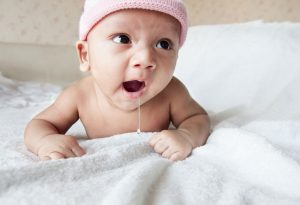
When your baby develops motor skills like chewing on her hands motor receptors in her mouth send signals to the brain to initiate saliva production a sign that she may be ready to eat. Drooling fulfills several important functions for your baby.
It starts at 3 to 6 months of age of the baby.
Baby has a lot of saliva. For babies and newborn a lot of saliva may be a normal part of a childs development. However too much drooling and uncontrollable salivation may be a sign of other medical concerns. When this occurs consult a medical doctor is highly recommended to determine the underlying conditions.
Baby has lots of saliva bubbles. Hi Mommies My daughter is 7 weeks old she gets a lot of saliva bubbles very often and during bathing especially when I wash her head she keeps a lot of those bubbles and cries making it hard for her to breath. It is getting scary for me to bath her.
Please share you views and any tips on how I can overcome this. The increased flow of saliva that often signals the appearance of a new tooth seems to soothe tender gums. However if your baby appears to be drooling excessively and looks ill she may be having trouble swallowing which requires medical attention.
The Role of Saliva. Drooling fulfills several important functions for your baby. Subconsciously the body of the baby is protected from infections secreting excessive amount of saliva.
In addition to anti-inflammatory and lubricating saliva also has a bactericidal effect. The human mouth is cleared of germs through saliva. Lots of saliva and choking.
My LO is 8 weeks and ive noticed today she has lots of saliva and keeps dribbling. Because of the saliva she sounds like she is gargling and keeps choking to the point of being sick sometimes. She was asleep and just woke herself up gasping she had turned purple and her eyes were streaming with water.
When your baby develops motor skills like chewing on her hands motor receptors in her mouth send signals to the brain to initiate saliva production a sign that she may be ready to eat. Basically your baby develops the muscles and digestive saliva just as soon as she needs it to eat solid foods. She goes through 8 bibs a day or more.
Baby choking on saliva can be caused by teething sleep apnea infant reflux etc. In this case do not diagnose by yourself and seek advice from your pediatrician. Due to the constant dribbling of saliva through the mouth a babys lower lips cheeks neck and chest may show signs of skin irritation.
If your baby drools excessively the saliva will come on to his cheeks neck or chest and you might notice red uneven rashes in. Saliva leaking out of your babys mouth can irritate the sensitive skin on his chin neck or chest creating a bumpy red rash. To treat a drool rash carefully wash the inflamed skin pat it dry and soothe it with a lanolin ointment.
Swallowing large amounts of saliva can also give your baby watery stools diarrhea and ultimately a diaper rash. Many babies start salivating a lot when they are about to sprout teeth. They constantly try to bite into something and that makes their salivary glands to become overtly active.
Infection Your baby might be having some saliva rash or infection inside the mouth that is producing too much drool. For the average child unnecessary loss of saliva stops around age 4. For other children however it can be excessive.
According to Morris Klein in Pre-Feeding Skills Second Edition the following possible causes of excess drooling might include. Teething which results in more saliva production. Saliva is derived from blood which helps maintain the health of hard and soft tissues in your mouth.
Healthy saliva flow can wash food away from the teeth and gums breaks down food for easy swallowing enhances your ability to taste and prevents cavities and other infections. Saliva even keeps the surface of your teeth strong by contributing. Hi Lisa There are many reasons why your child is holding saliva.
If you are in the Tulsa area please call our dental office at 918 455-7700 and ask what Dr. Owens might suggest to help. Best wishes Aqua Dental Marketing Team.
Nokuthula on August 18 2020 at 808 am. My child is 3 years he is not swallow saliva. This happens when your baby is probably bursting bubbles of saliva from their mouth.
It is more than just gas escaping but in some cases the saliva makes it feel like your baby is spitting out clear liquid. This often happens if your baby is fed a lot. Drooling usually begins at the age of two to three months when the babys salivary glands become functionally active 1.
Babies lack precision control of their neck muscles and thus may not swallow the saliva produced continuously in their mouths. Young infants also do not have teeth to hold back the saliva. As I said above that refers to excessive production of saliva unintentionally.
Drooling is also encountered in healthy children it is commonly observed in neurologically impaired children and carries considerable social stigma. The baby starts drooling at a baby and stops at the stage of a toddler. It starts at 3 to 6 months of age of the baby.